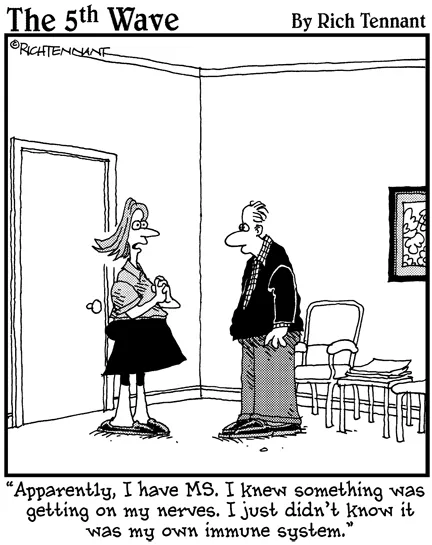Chapter 1
Meeting MS Face to Face
In This Chapter
Exploring how MS affects your body
Determining what triggers MS
Recognizing the uniqueness of your MS
Taking a peek at the available MS treatments
Understanding the impact of MS on your family and work life
Gearing up to keep your life on track
Because you’ve picked up this book, we’re assuming that your doctor has delivered the news that you have multiple sclerosis (MS). Or, perhaps he or she said that you may have this disease, or that you probably have this disease (which makes you wonder why you can’t get a clear answer). Whether you got the news yesterday or several months ago, you’re probably trying to figure out what it means for you, for your future, and for your family. In other words, you have about a zillion questions about what’s in store.
Chances are, the answers you’ve received so far haven’t been all that satisfying — mostly because MS still can’t be cured, no one knows what causes it, and no doctor can predict with any certainty how your MS is going to behave in the future. However, the good news is that the treatment options are expanding, and people with MS are busy getting on with their lives — and you will too.
In this chapter, which is an introduction to MS and an overview of what we cover in the rest of the book, we fill you in on the available MS info — including what scientists have been able to discover about the workings of this disease and what questions remain to be answered. We explain why your MS is different from everyone else’s, and we introduce you to the treatment strategies that can help you manage your MS. Finally, we glance at the ways that MS can affect life at home and at work, and we show you what you can do to ensure the best possible quality of life for you and the people you love.
Introducing the Roles Your Immune and Nervous Systems Play in MS
Surprise! Even though MS is described as the most common neurologic disorder diagnosed in young adults, the problem doesn’t appear to originate with the nervous system. Instead, decades of research have pointed to the body’s immune system as the culprit. Some kind of malfunction in the immune system interferes with the functioning of the body’s nervous system, resulting in the symptoms commonly associated with MS. The current thinking is that the glitch is an autoimmune problem, which basically means that your body is mistakenly destroying some of its own healthy tissues and cells. But, this thinking has yet to be proven. We explain the autoimmune process in the section “What happens in MS” later in the chapter, but for now, understanding how the immune system is supposed to work when it’s healthy is important.
The immune system: Your body’s frontline defender
The immune system — which is a complex network of glands, tissues, and circulating cells — is your body’s frontline defense in the fight against infection by viruses, bacteria, and other bad guys. When confronted with an infection, the immune system gears up to neutralize the foreign invader and make you healthy again.
In order for your immune system to do its job properly, it has to be able to distinguish between the good guys (the cells, tissues, and organs that make up your body) and the bad guys (any foreign invader, such as a virus or bacteria that doesn’t share your genes). And get this: The immune system is so powerful that it could reject a pregnant woman’s developing fetus (which shares only some of her genes) if the hormones of pregnancy didn’t suppress her immune system. (Check out Chapter 16 to read more about how pregnancy hormones appear to affect MS.)
The nervous system: Your body’s CEO
The nervous system, which controls all bodily functions, is made up of neurons, each of which consists of a cell body and its long extension — the axon. And many axons are covered by a protective or insulating coating called myelin. The neurons are gathered into small- and large-sized bundles called nerves.
The system is basically divided into two parts: The central nervous system (CNS), which consists of the brain, spinal cord, and optic nerves, is the target of the damage done in MS. The peripheral nervous system (PNS) includes the branching network of nerves and axons that connects the CNS to muscles, sensory organs, and glands in the rest of the body.
The nervous system conducts four basic kinds of electrical signals throughout the body:
Motor signals: These signals, which move from the CNS, through the PNS, and to muscles and other organs, control movement, strength, and other bodily functions.
Sensory signals: These signals go back to the CNS from the eyes, ears, skin, and other sensory organs, and they provide information about the environment from those organs.
Autonomic signals: These signals go to your GI system, your bladder, your sexual organs, and other parts of the body that often act without conscious control.
Integrative signals: These signals travel from nerve cell to nerve cell within the nervous system and are thought to be responsible for many cognitive functions, such as thinking and memory (check out Chapter 9 for information about cognitive changes in MS).
These electrical signals are like the current in an electrical wire: When everything is working fine, they travel long distances along the myelin-covered axons in the CNS, jumping from one axon to another as needed. The myelin (like the rubber or plastic insulation around an electrical wire) is what helps speed the electrical signals on their journey and smoothes out any bumps along the way.
What happens in MS
After you understand the role of the immune system and the nervous system, you can begin to understand how MS affects them. In autoimmune diseases like MS (and rheumatoid arthritis, myasthenia gravis, and Type I diabetes, among others), the immune system loses the ability to distinguish the good guys from the bad guys, and so it starts attacking the normal tissues in the body. In MS, this autoimmune response targets the myelin coating around the axons in the CNS, the axons themselves, and the cells that produce the myelin — called oligodendrocytes.
The autoimmune attack happens because of a breakdown in the
blood brain barrier (BBB), which allows immune cells that have been living harmlessly in your blood to travel into your CNS to attack the myelin and axons, resulting in the symptoms associated with MS. The autoimmune process in MS follows these steps (see Figure 1-1):
1. The inflammation that occurs during an MS relapse (also called an attack or exacerbation) damages the BBB, allowing the movement of immune cells into the CNS. (Skip to Chapter 6 for more info about MS relapses.)
2. Toxic substances are released into the CNS, which can increase inflammation and result in the breakdown of myelin (in a process called demyelination) and the axons, sometimes even affecting the nerve cell bodies.
3. Nervous system cells called astrocytes move into the locations where the damage has occurred, and t...













